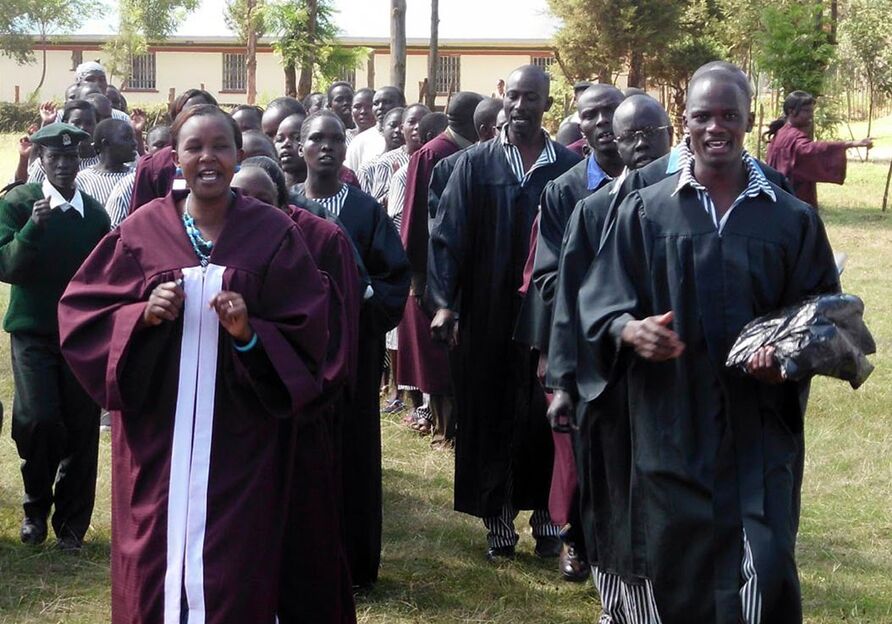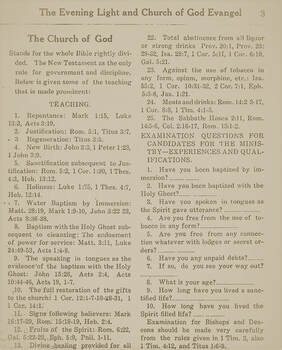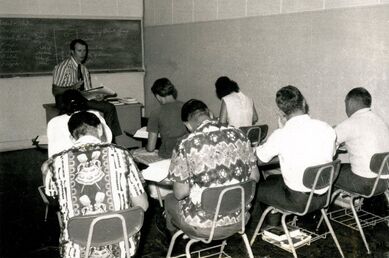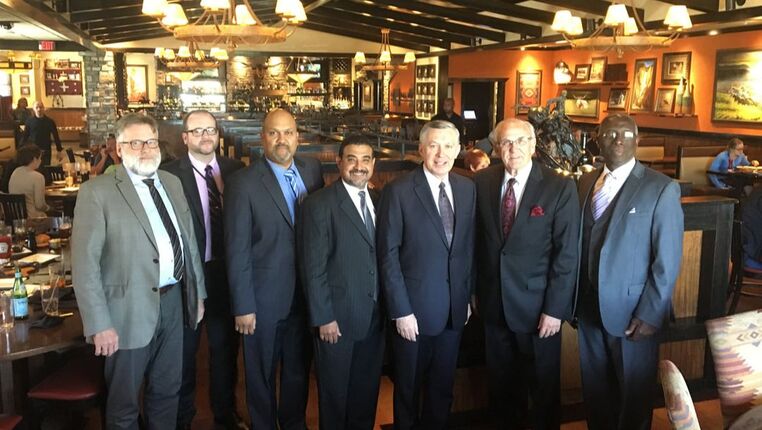FULFILLING THE VISION:
MINISTERIAL DEVELOPMENT
& THE SCHOOL OF MINISTRY
Daniel Tomberlin
DURING THE FIRST week of November 1917, delegates to the 13th General Assembly of the Church of God gathered in Harriman, Tennessee. A.J. Tomlinson reminisced over the progress of the Church of God since 1906. Even as he celebrated the advances, he lamented missed opportunities. One of the missed opportunities was the proper training of the ministers. Tomlinson declared, “We have been plodding along for thirteen years without a regular Church Bible training school. I feel that much time has already been lost on this account. . .”
The General Assembly had already decided that those who answered the call to serve as pastor or evangelist were to be duly examined and ordained. In 1910, delegates appointed a committee to prepare an examination for ministerial candidates. Later that year the first Church of God “Teaching” appeared in The Evening Light and Church of God Evangel for the purpose of ministerial education and examination with the admonition that “examination for Bishops and Deacons should be made very carefully.” The preamble to our “Teachings” then and now begins, “The Church of God stands for the whole Bible rightly divided.” In 1913, Tomlinson presented, and the Assembly approved, “endorsement blanks and examination certificates” that included eighty-three questions “which the [ministerial] applicant is to answer.” The Church of God made its first serious efforts at ministerial development with the establishment of the Bible Training School in 1917. Even so, the majority of credentialed ministers had no formal training. The first denomination-wide effort at ministerial training would be decades in coming.
The General Assembly had already decided that those who answered the call to serve as pastor or evangelist were to be duly examined and ordained. In 1910, delegates appointed a committee to prepare an examination for ministerial candidates. Later that year the first Church of God “Teaching” appeared in The Evening Light and Church of God Evangel for the purpose of ministerial education and examination with the admonition that “examination for Bishops and Deacons should be made very carefully.” The preamble to our “Teachings” then and now begins, “The Church of God stands for the whole Bible rightly divided.” In 1913, Tomlinson presented, and the Assembly approved, “endorsement blanks and examination certificates” that included eighty-three questions “which the [ministerial] applicant is to answer.” The Church of God made its first serious efforts at ministerial development with the establishment of the Bible Training School in 1917. Even so, the majority of credentialed ministers had no formal training. The first denomination-wide effort at ministerial training would be decades in coming.
General Board of Education
The 1968 General Assembly appointed the first permanent General Board of Education. R. Leonard Carroll was the executive director of the board, and H.D. Williams, James M. Beaty, Robert E. Fisher, Albert M. Stephens, and Robert White served as members. From that board, the Department of General Education emerged in 1974 with Robert White as the first director.
In 1971, the General Board of Education launched the series of Bible Institutes for Ministerial and Lay Enrichment in three locations—Los Angeles, California; Birmingham, Alabama; and Hamilton, Ohio. Within five years, the program had expanded to include 48 locations in 20 states with a total enrollment of more than 1,500. The sessions included biblical and theological studies, Pentecostal studies, and historical studies.
The 1968 General Assembly appointed the first permanent General Board of Education. R. Leonard Carroll was the executive director of the board, and H.D. Williams, James M. Beaty, Robert E. Fisher, Albert M. Stephens, and Robert White served as members. From that board, the Department of General Education emerged in 1974 with Robert White as the first director.
In 1971, the General Board of Education launched the series of Bible Institutes for Ministerial and Lay Enrichment in three locations—Los Angeles, California; Birmingham, Alabama; and Hamilton, Ohio. Within five years, the program had expanded to include 48 locations in 20 states with a total enrollment of more than 1,500. The sessions included biblical and theological studies, Pentecostal studies, and historical studies.
|
|
|
ROBERT E. FISHER
The California native became an exhorter on July 17, 1951, beginning a highly respected ministerial vocation. He studied at West Coast Bible College where he quickly rose to serve as the superintendent from 1956–1960. He left the school to pastor a small church in Fresno, which became the largest Church of God west of the Mississippi. Fisher served as the overseer of Hawai‘i (1967–1974) followed by Maryland-Delaware-D.C. (1974–1976). Fisher’s vision for ministerial development led to his appointment as the executive director of the Department of General Education where he served from 1976 to 1984. His leadership resulted in dramatic expansion of the department’s role. He later served as the overseer of North Georgia, member of the International Executive Committee, and director of Ministerial Care. His final ministerial office was the founding director of the Center for Spiritual Renewal, an interdenominational ministry advancing revival in churches and communities. He served on numerous advisory bodies, including the General Board of Education, Council of Eighteen, and Lee College Board of Directors, as well as providing leadership to the development of the Church of God’s current Practical Commitments statement. Among his books are The Family and the Church, The Joy of Relationship, and Quick to Listen, Slow to Speak. Fisher embodied a passion for developing doctrinally sound and practically prepared ministers. D.E. “Gene” Mills, Jr., Th.M. |
Church of God School of Ministry
As the Church of God looked toward the twenty-first century, international leadership began to utilize a divisional approach to ministry with each division under the administration of a member of the International Executive Committee. This approach included a Division of Education, which developed a School of Ministry (SOM). In 1999, the SOM established certificate-level ministerial training for ministers. Paul L. Walker, longtime pastor of the Mount Paran Church of God in Atlanta, Georgia, and then serving as general overseer became chancellor. Walker recognized that it was difficult for pastors to leave their places of ministry to attend the university. He envisioned a process of providing quality education that would be portable for active ministers—a prototype of online learning several years before it became widely available. The mission of the SOM was to design and provide a video-based curriculum that included doctrinal, biblical, and pastoral studies for the training of ministers. The program envisioned Distant Learning Centers (DLCs) being established in every region of the United States and International Learning Centers throughout the world. Students who complete the entire program of twenty courses for thirty-four credits earn the Certificate In Ministerial Studies (CIMS). Presently, the School of Ministry CIMS program is available online for ministers throughout the world. CIMS courses are now available in more than ten languages. Also, many Bible institutes and colleges have adopted the CIMS courses as their primary curriculum. The Department of Ministerial Development and the School of Ministry merged in 2006 to become Ministerial Development/School of Ministry (MD/SOM). Donald Aultman became chancellor. With the merger of the two entities, Don Bennett became USA coordinator for MD/SOM and Dwain Pyeatt became international coordinator. Bennet and Pyeatt direct MD/SOM ministries, including MIP, CIMS, and ministerial credentialing throughout their assigned geographical areas. Aultman, Bennett, and Pyeatt strengthened the MIP with new curriculum and seminars developed around the ten core values of the Church of God. They incorporated 35 goals relating to ministry practice into the practicum and provided weekly teaching resources for supervising pastors. With the global availability of the Internet, the MD/SOM provides all courses online. During this period, the International Executive Committee authorized the development of the Calling And Ministry Studies (CAMS) program as a prerequisite for the exhorter’s credential and the MIP. The purpose of the CAMS program is to help ministerial candidates discern the nature of their call to ministry. With the addition of CAMS to the MIP program, all ministers in the Church of God can earn twenty CIMS credits over a period of twelve months. A.J. Tomlinson’s decades-old vision for ministerial development is being realized. |
USA HISPANIC EDUCATION MINISTRIES
As an integral part of the Division of Education, USA Hispanic Educational Ministries (USAMEH) provides biblical, ministerial, theological, and general education studies to the Hispanic/Latino community of the United States and Canada. USAMEH partners with state and regional administrative bishops by training individuals who are actively involved in Christian service in the local church, much of which is coordinated through an extensive network of church-centered Bible Institutes. USAMEH also coordinates with higher-level education providers such as Lee University and the Pentecostal Theological Seminary.
|
Global Education Initiative
and the FINISH Commitment As the Church of God seeks to engage the 21st century, ministerial development continually retools for the next generation of leaders. In 2016, the International Executive Committee appointed Michael L. Baker as chancellor of Church of God educational endeavors and institutions. He has envisioned the Global Education Initiative, which will provide global support for the FINISH Commitment by working to enhance educational endeavors throughout the world. With the exponential growth of the Internet, the Division of Education is working to expand distance educational opportunities and develop an Online Media Network. This network plans to make available digital books, journals, and other resources to educational institutions across the globe. Church of God Ministerial Development programs serve the various needs of the church’s ministry. With ministerial enrichment programs, certificate programs, universities, and seminaries that offer advanced degrees, the Church of God is striving to prepare its ministers for the challenges ahead. The church expresses its commitment to the Holy Bible as the inspired Word of God through the prayerful study of its ministers. Church of God Ministerial Development is committed to developing women and men with sharp minds and passionate hearts, anointed by the Holy Spirit to engage the 21st century with the gospel of Jesus Christ. |
Desarrollo Ministerial
Durante la Asamblea General del 1968, fue aprobada el establecimiento de una Junta General de Educación y Leonard Carroll fue nombrado director del departamento. De ahí surgió el Instituto Bíblico de Enriquecimiento Ministerial como el primer paso hacia la capacitación ministerial de toda la iglesia. Robert Fisher continuó esta labor con sus proyectos pilotos en los estados de Hawái y Maryland-Delaware-D.C. El Programa Ministerial Supervisado (MIP por sus siglas en inglés) incluye una serie de cursos, seminarios y prácticas, y terminó convirtiéndose en un requerimiento para todos los aspirantes al ministerio. En la década de los noventa, bajo la dirección de Larry Hess, el nuevo Departamento de Desarrollo Ministerial revisó el PMS y logró que la Universidad de Lee reconociera los créditos, extendiendo el programa fuera de los Estados Unidos y capacitando más supervisores. En el 1998, Paul Walker se convirtió en el primer canciller de Desarrollo Ministerial, dándole forma a la Escuela de Ministerio (SOM, por sus siglas en inglés), un programa que ofrece el Certificado de Estudios Ministeriales, primero por video en Centros de Aprendizaje a Distancia, luego en línea. Ahora está disponible en diez idiomas y en nuestras escuelas bíblicas por todo el mundo. En 2006, Desarrollo Ministerial y la Escuela de Ministerio fueron fusionadas bajo la cancillería de Don Aultman, con Don Bennett como el coordinador dentro de los EE. UU. y Dwain Pyeatt como el coordinador internacional. Desde 2016, Michael Baker sirve como canciller y supervisa la visión educativa de la iglesia, incluyendo la Iniciativa de Educación Global. |
Daniel Tomberlin, D.Min., is director of Student Placement and instructor in Pastoral Ministry at the Pentecostal Theological Seminary.




